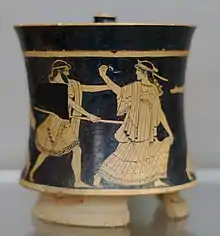Aegina (mythology)
Aegina (/iˈdʒaɪnə/; Ancient Greek: Αἴγινα) was a figure of Greek mythology, the nymph of the island that bears her name, Aegina, lying in the Saronic Gulf between Attica and the Peloponnesos. The archaic Temple of Aphaea, the "Invisible Goddess", on the island was later subsumed by the cult of Athena. Aphaia (Ἀφαῖα) may be read as an attribute of Aegina that provides an epithet, or as a doublet of the goddess.
| Look up Aegina in Wiktionary, the free dictionary. |

Painting by Ferdinand Bol.
| Greek deities series |
|---|
| Nymphs |
Family
Though the name Aegina betokens a goat-nymph,[1] such as was Cretan Amalthea, she was given a mainland identity as the daughter of the river-god Asopus and the nymph Metope; of their twelve or twenty daughters, many were ravished by Apollo or Zeus. Aegina bore at least two children: Menoetius by Actor, and Aeacus by Zeus, both of whom became kings. A certain Damocrateia, who married Menoetius, was also called her daughter by an unknown consort.[2]
The mortal son Menoetius was king of Opus, and was counted among the Argonauts. His son was Patroclus, Achilles' first cousin once removed through their paternal family connection to Aegina, and his intimate companion.
The son made immortal, Aeacus, was the king of Aegina, and was known to have contributed help to Poseidon and Apollo in building the walls of Troy. Through him Aegina was the great-grandmother of Achilles, who was son of Peleus, son of Aeacus.

Mythology

The Abduction of Aegina
Legend has it that Zeus took the form of an eagle (or a great flame in Ovid's telling) and abducted Aegina,[3] taking her to an island near Attica,[4] then called Oenone;[5] henceforth known by her name. Aegina's father Asopus chased after them; his search took him to Corinth, where Sisyphus was king. Sisyphus, having chanced to see a great bird bearing a maiden away to a nearby island, informed Asopus. Though Asopus pursued them, Zeus threw down his thunderbolts sending Asopus back to his own waters. Aegina eventually gave birth to her son Aeacus, who became king of the island.
In popular culture
- Aegina is one of the "follower" cards in Collectible Card Game Shadowverse, able to reduce any damage dealt to the player's leader by 3.
- Aegina was the name of a slave caught by Hera who Hercules rescued in the Pilot episode The Wrong Path of Hercules: The Legendary Journeys and she was played by Clare Carey.
Notes
- Compare Aegis, Aegeus, Aigai "place of goats", etc.
- Scholia on Pindar, Olympian Ode 9, 107
- Bibliotheke 3.11.2; Pindar, Isthmian Odes viii and Nemean Odes viii; Ovid, Metamorphoses vi.3.
- A mythic inversion, as Aegina simply was the nymph of the island, whose culture, continuous from an early date, long preceded the introduction of the Olympian gods. Ceramic fragments at Aegina attest to trade with Minoan Crete and with the Cyclades.
- "Wine Island", thus not an indigenous name after all: the introduction of viticulture provides many mythemes for the Hellenes.
References
- Robert Graves, The Greek Myths (1955) 1960, 66.b.1; 67.f; 138.b.
- Edith Hamilton, Mythology (1940) 1942 Mentor